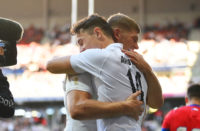 Forget all the flannel following the nightmare RWC 2015 draw that England and Wales have to beat everyone of note to win a World Cup anyway, because it simply isn't true. In 2011 New Zealand did not have to play their arch-rivals, South Africa, on the way to becoming world champions, and in 2007 the Springboks also found a route to the final without having to play the New Zealanders.
Forget all the flannel following the nightmare RWC 2015 draw that England and Wales have to beat everyone of note to win a World Cup anyway, because it simply isn't true. In 2011 New Zealand did not have to play their arch-rivals, South Africa, on the way to becoming world champions, and in 2007 the Springboks also found a route to the final without having to play the New Zealanders.
The reality is that when it comes to shooting themselves in the foot international rugby, in the guise of Rugby World Cup Ltd, have no equal. There was blood on the tiles on Monday when the draw for the tournament, made at the Tate Modern in London, ended up with the host nation, England, and their neighbours, Wales, alongside Australia in Pool A, the toughest pool by some distance. And it is not just the toughest pool in 2015, but arguably the toughest faced by any host nation since the tournament's inception in 1987.
Wales were complicit in the cock-up because they failed to finish this autumn in the top eight places in the IRB World Rankings, finishing ninth after losing their last seven Tests in succession, and England didn't help their own chances of an easier pool by finishing fifth in the rankings, leaving them outside the top four seeds.
 Pool A was immediately dubbed the ‘pool of death', and Australia, who finished third in the rankings, were left to ponder exactly how they ended up in a pool with the host nation and last season's Six Nations Grand Slam champions. The RWC administrators also had plenty to think about, having created a format with an in-built Armageddon formula.
Pool A was immediately dubbed the ‘pool of death', and Australia, who finished third in the rankings, were left to ponder exactly how they ended up in a pool with the host nation and last season's Six Nations Grand Slam champions. The RWC administrators also had plenty to think about, having created a format with an in-built Armageddon formula.
Putting the host nation in jeopardy in the opening stage of the competition is as dim as it gets, especially when you are relying on them to generate huge public interest in the tournament, as well as selling the game to a new generation of players – not forgetting their obligation to fill international rugby's coffers.
Nobody is proposing that the draw should be rigged to give the hosts a safe route to the final, but when there are four pools, and three of them include only two top eight nations, having a ranking system that handicaps the tournament's flagship country makes little sense. Nor does a line being drawn in the sand at the end of an autumn series three years before the World Cup add up, mainly because the further you are away from the tournament the greater the potential for the rankings to be outdated.
An additional issue is that the rankings favour the Southern Hemisphere nations with the autumn cut-off coinciding with the end of their season. This allows Australia, South Africa, New Zealand and Argentina to come north after spending four months together, making them virtual club teams, when the European sides are not even half-way through their own season and have not played the Six Nations, their main tournament.
The end of the Six Nations in March would make a fairer break-point for the rankings than the autumn series. For instance, after their last Six Nations campaign Wales were fifth in the world pecking order, and there is every chance that they will finish the 2013 Six Nations with enough wins to move back into the top eight.
In terms of timing it would also be better for teams to be seeded in March almost two years before a World Cup, rather than three, so that form is reflected as close to the tournament draw as possible. That gives organisers, sponsors, local councils, travel agents, and anyone else with logistical matrixes to put together, 21 months to make them work – and that should be plenty.
If the administrative and commercial tail is allowed to wag the rugby dog, as it has in 2015 there is a grave danger of the tournament going south, in every sense.
Just to re-cap in case anyone missed the salient point: either England, Wales or Australia will go out in the pool stage.
The worst-case scenario is England failing to reach the knockout stages, because if they did, even though the English have a reputation for supporting sport for sports sake, it would be a body blow from which the tournament would never recover. The level of interest would plummet, the feelgood factor would become the misery measure, and the organisers could be faced with half empty stadiums.
Given the number of Welsh rugby fans on both sides of the Severn, an early exit for Wales would also have significant drawbacks. It would put the kibosh on England and Wales meeting further along the line, killing one of the game's arch-rivalries stone dead, and would also guarantee that any neutral games played at the Millennium Stadium were not much of an attraction.
The 2015 draw guarantees that all eyes will be on Pool A, and the interest during the opening rounds will be massive. So will the pressure on referees, because so much is riding on the outcome – and we have already had more than enough instances of referees being overwhelmed by the sheer weight of pressure, with Bryce Lawrence's hounding out of the game after South Africa's 2011 controversial quarter-final defeat the most obvious example.
One Comment
Leave a Comment
You must be logged in to post a comment.


























The rankings give the SH an advantage? Good God man by the time they get to England, and their Celtic colonies, they have flown around the world several times and are exhausted. How else could Ireland have beaten Argentina and England the All Blacks. The All Blacks could barely finish the game against Wales.
There is no advantage and the racist Gerrymander, aka the IRB, ensures the blatant stacking of the competition with third rate officials from the 6N, who are unfit and are unable to referee in the desired manner. Add to that the racist spectators at Twickenham and we have a dog’s breakfast.